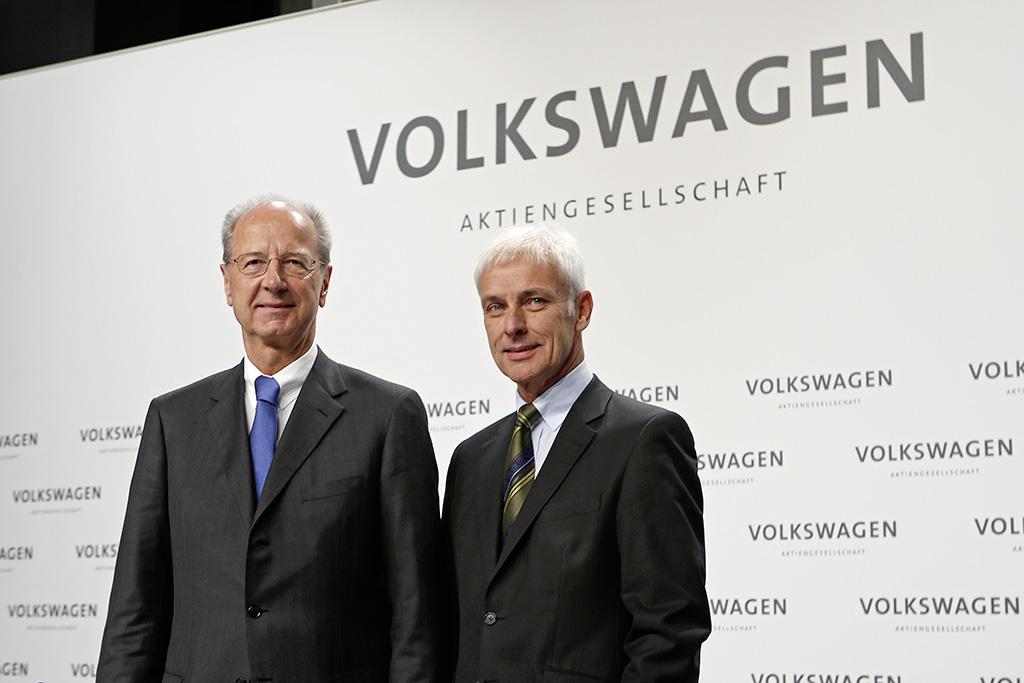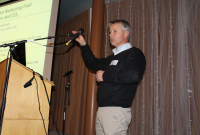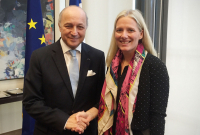Support strong Canadian climate journalism for 2025
German automaker Volkswagen AG and related companies will pay more than $15.3 billion to the United States government and consumers after it was caught cheating on emissions tests.
Canadian officials have yet to announce any penalties. A portion of the U.S. payment will be used to accelerate green vehicle deployment and there is no word whether a similar program will be implemented in Canada.
Volkswagen admitted last fall that it used defeat devices on nearly 500,000 diesel cars sold in the U.S. and about 100,000 vehicles sold in Canada between 2009 and 2015. The devices were designed to fool government labs during indoor testing, hiding the fact that Volkswagen vehicles were spewing up to 40 times more toxic pollution than advertised.
U.S. authorities spelled out the proposed penalties on Tuesday, that include an option that would allow motorists to sell back their cars to the automaker.
“By duping the regulators, Volkswagen turned nearly half a million American drivers into unwitting accomplices in an unprecedented assault on our environment,” said Deputy Attorney General Sally Q. Yates.
“This partial settlement marks a significant first step towards holding Volkswagen accountable for what was a breach of its legal duties and a breach of the public’s trust.”
Yates said the announcement is an important step forward, but not the final say on the matter.
“We will continue to follow the facts wherever they go.”
The nationwide agreements represent the largest U.S. settlement with an automaker in history, the Los Angeles Times reported.
The payments are for two related settlements, one with the U.S. and the State of California, and one with the U.S. Federal Trade Commission. Federal Justice Department officials were also pursuing a separate criminal investigation on the scandal, the newspaper reported.
The auto manufacturer will offer consumers a buyback and lease termination for nearly half a million cars dating from 2009 to 2015. The effected cars are 2.0 litre diesel vehicles sold or leased in the U.S.
The company and its related entities will spend up to 10.03 billion to compensate consumers. In addition, the companies will spend another $4.7 billion to mitigate pollution from those cars and invest in green vehicle technology.
Canadian settlement still pending
Volkswagen Canada said in Canada the parties to proposed class proceedings are in discussion about potential settlements and remedies for the affected vehicles. The parties aim to provide an update to Canadian courts on or before July 29, 2016.
Volkswagen said it is working with the U.S. Environmental Protection Agency to develop approved vehicle repairs as quickly as possible. Upon approval, repairs would be offered to Canadian customers in full co-operation with Environment Canada.
An Environment and Climate Change Canada spokesman noted that the U.S. resolution relates to a civil suit. "In this country, alleged infractions of the under Canadian Environmental Protection Act may be prosecuted under criminal law which has a higher evidentiary standard than civil law does," Sébastien Gauthier said in an email to National Observer.
Gauthier said that the department's enforcement branch is continuing to investigate the potential illegal importation into Canada of certain Volkswagen, Audi and Porsche models equipped with the illegal defeat devices.
As well, the department is currently reviewing the latest development in the U.S. to help inform the next steps in Canada and will be meeting with Volkswagen Group Canada Inc. the week of July 4th to discuss what measures the company might introduce in Canada.
Gauthier noted that under the Notice of Defect provisions governed by the Canadian Environmental Protection Act, 1999, Volkswagen Group Canada Inc. is required to notify current owners of affected vehicles over any corrective action that might be necessary for their cars
Maggie MacDonald, who manages a program at Toronto-based Environmental Defence that scrutinizes toxic substances in consumer products, said the federal agency should follow the U.S.’s lead and impose a penalty.
“This is a case of deliberate deception and this will cost our government in the long run,” MacDonald said.
She pointed out that increased rates of air pollution are not just an environmental problem, but a health issue, with 8.5 per cent of Canadians aged 12 and over suffering from asthmas, and noted that people with respiratory conditions will be impacted as well.
“There’s health care costs associated with that. I definitely think it’s worth investigating and fining as appropriate.”
Richard Corey, the executive officer of CARB, called Volkswagen’s actions “deeply unfair” to Californians.
“It was also a violation of the trust that consumers put in Volkswagens’ marketing claims that it was producing clean vehicles. We hope that VW now understands that if you cheat you are going to get caught -- and when you do, it will be costly.”
The money for California includes $800-million in investments to advance the state’s zero-emissions vehicle programs. Volkswagen will make the payments and investments in installments over several years.
About 500,000 Volkswagen and Audi vehicles are affected by the cheating scandal in the U.S. and about 100,000 in Canada, estimate the government regulators. The affected models have been sold since 2008 up until 2015 and collectively represent tens of thousands of tonnes of toxic gases poisoning the atmosphere every year.
Emission levels reached up to 40 times the legal standard
In September 2015, CARB and U.S. Environmental Protection Agency announced that VW had admitted installing certain software in all 2.0-liter diesel passenger cars, model years 2009 through 2015.
The software was specifically designed to detect when the car was being tested in the laboratory and to meet the rigorous certification standards for emissions.
But outside the lab, the software detected when the car was on the open road and effectively bypassed emissions control equipment. As a result, emissions of nitrogen oxide in normal, everyday driving reached levels up to 40 times the legal standard.
In addition to the buyback option, Volkswagen may also propose an emissions modification plan to U.S. agencies and if approved, VW will offer owners and lessees the option of having their vehicles modified to substantially reduce emissions in lieu of having the car bought back by VW.
A National Observer story in February showed that the former Harper federal government misled Canadians about its investigation into Volkswagen during the fall election campaign, erroneously suggesting that it had acted swiftly on the emerging pollution cheating scandal, despite the absence of a paper trail to confirm its claims.
Internal emails from a federal vehicle testing facility showed no signs that enforcement officials had asked the top scientists at the lab to proceed with a full investigation, prior to September 2015 when the U.S. Environmental Protection Agency and the California Air Resources Board went public with details about their own probes.






Comments